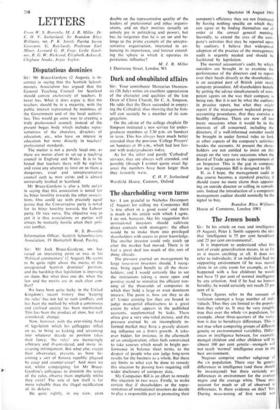LETTERS
From W. S. Brownlie, M. J. R. Miller, Dr C. H. V. Sutherland, Sir Brandon Rhys Williams, MP. P. K. Smith, Partha Surra Goswami, G. Reichardt, Professor Earl Miner, Leonard G. H. Fuge, Leslie Gard- ner. R. G. W. Rickcord, Elizabeth Ackroyd, Chigbata Nnake, Joyce Taylor.
Disputatious dominies
Sir: Mr Bruce-Gardyne (2 August), is in- correct in saying that the Scottish School- masters Association has argued that the General Teaching Council for Scotland should consist exclusively of teachers. It never has. What it does argue is that the teachers should be in a majority, with the public interest represented by nominees of the Government and of the local authori- ties. This would go some way to creating a truly professional council, instead of the present bogus body which includes repre- sentatives of the churches, directors of education, etc., who have an interest in education but none directly in teachers' professional standards.
The matter is not a purely local one, as there are moves afoot to set up a teaching council in England and Wales. It is to be
hoped that teachers there will be vigilant and resist any attempt to foist on to them a
dangerous, cruel and unrepresentative council such as now exists and is almost universally loathed in Scotland.
Mr Bruce-Gardyne is also a little unfair in saying that this association is noted for its bitter hostility towards the other associa- tions. One could say with precisely equal justice that the Conservative party is noted for its bitter hostility towards the Labour party. Or vice versa. The objective way to put it is that associations or parties will always be mutually hostile when their poli- cies conflict.
W. S. Brownlie Information Officer, Scottish Schoolmasters Association, 19 Hunterhill Road, Paisley_ Sir: Mr Jock Bruce-Gardyne, MP. has raised an interesting point or two in his 'Political commentary' (2 August). He seems to be quite right about the merits of the unregistered Scottish dominies' position. and the hardship that legislation is imposing on them. But what does one do, when the law and the merits are in such clear con- flict?
We have been quite lucky in the United Kingdom's recent history that 'keeping the rules' has not led to such conflicts, and has been the method by which a continuous and civilised society has been maintained. This has been the product of slow, but well considered, change.
Now, however, with the ever-rising flood of legislation which his colleagues inflict on us, to bring us kicking and screaming into whatever decade or position takes their fancy, 'the rules are increasingly arbitrary and ill-considered, and invite in- creasing infringement. But what else, except their observance, prevents us from be- coming a sort of banana republic plagued by coup and counter-coup? And must we not, whilst campaigning for Mr Bruce- Gardyne's colleagues to diminish the scope of the rules, observe them implicitly whilst they exist? The rule of law itself is far more valuable than the illegal rectification of its defects.
He quite rightly, in my view, casts doubts on the representative quality of the leaders of professional and other organis- ations, and on their motives (usually an unholy joy in politicking and power), but has he forgotten that he is an MP and be- longs to the prime example of the unrepre- sentative organisation, interested in en- hancing its importance, and forever extend- ing the sphere in which it operates its pernicious influence?
M. J. R. Miller 1 Dunraven Street, London WI


































 Previous page
Previous page